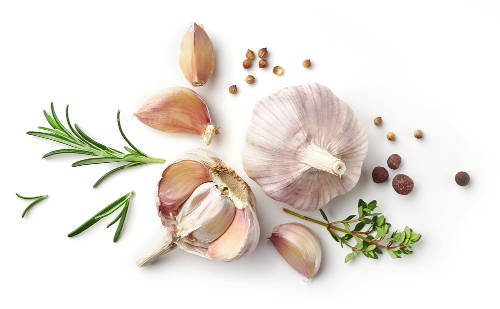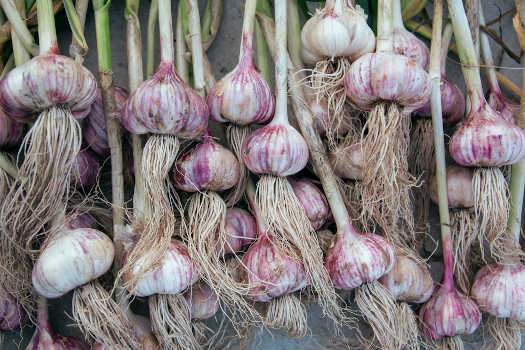It’s a mainstay of Italian and French cooking, and a remedy against vampires. Look in just about any supermarket’s produce section, and you’ll find it. Look in your kitchen, and you might accidentally be growing it.
Garlic (Allium sativum) is one of humanity’s most beloved herbs, and for good reason. These pearly bulbs are just as powerful as medicinal and magical ingredients as they are in aioli.
Magical Properties of Garlic
Garlic is most often used as a protective herb, though some sources also use it for banishing, hex breaking, courage, and even love magic.
Hanging a braided wreath of garlic over the front door is believed to repel thieves and people with evil intentions. Garlic is also used to keep away all types of vampires.
Garlic is considered an aphrodisiac, and can be added to recipes for this purpose. An old love formula involves soaking garlic cloves in wine, then giving some to a would-be lover to win their affections.
In American folk magic, garlic is often regarded as a power herb. It can be added to formulas to increase their power.
Garlic is ruled by Mars, and the element of fire. Astrologically, it’s associated with Aries. It is sacred to Hecate, and ancient Greek people would place it at crossroads as an offering to her.
Benefits & Uses of Garlic
Garlic is a very powerful medicinal herb. Most of its healing virtues come when the cloves are crushed and allowed to oxidize. This converts the volatile compound alliin to allicin.
Allicin has been studied as a potential treatment for antibiotic-resistant infections. Many folk remedies use crushed or shopped garlic for this purpose. Right now, more research is needed to determine how effective garlic is, and, if so, at what dose.

Garlic is often consumed for hypertension. In clinical studies, it was found to produce a small decrease in blood pressure.
Consumption of garlic and other members of the allium family is associated with a decreased risk of stomach cancer.
Possible Risks & Side Effects of Garlic
Like any food, garlic has the potential to cause allergic reactions that range from mild rashes to potentially lethal anaphylaxis. If you’re allergic to shallots, onions, leeks, or any other alliums, substitute a different herb for garlic. Some people who are allergic to ginger or bananas also cross-react to garlic.
Consuming garlic causes garlicky-smelling breath because of its many sulfur-containing compounds.
Applying garlic topically can cause burns. If you choose to use it this way, dilute it well and don’t use it straight. Never apply straight, raw garlic to mucous membranes.
Consuming large amounts of raw garlic can cause potentially severe stomach pain.
If you are currently taking anticoagulants, consuming large quantities of garlic can interfere by increasing the risk of bleeding. If you wish to begin using garlic supplements, talk to your doctor about adjusting your dose and testing your clotting factors.
Even if you aren’t on anticoagulants, medications known to slow blood clotting (including Aspirin, ibuprofen, and some antidepressants) can interact with garlic and cause an increased risk of bruising or bleeding.
When consumed in the amounts you’d use to flavor food, garlic is safe for most people.
Garlic History & Folklore
People have grown garlic for over five thousand years. Egyptian art depicted it as an offering to the gods. Roman legionaries ate it for strength and courage in battle.
Galen of Pergamon, a Greek physician in the Roman empire, touted garlic as a cure-all.
Garlic was purported to be one of the key ingredients of Four Thieves’ vinegar. This legendary concoction was said to have protected four thieves from the bubonic plague.

Depending on the legend, they either used it to protect them while they robbed the homes of plague victims, or used it to protect them while they buried dead bodies as part of their sentence.
Pickled garlic was once thought to be disliked by tigers. People would consume it before passing through areas where they feared tiger attacks.
The folklore of central Europe described garlic as a powerful ward against werewolves, vampires, demons, and the evil eye.
Getting Started With Garlic
Garlic is very easy for most people to grow — leave some in your refrigerator and forget about it, and you might come back to a bunch of healthy green sprouts.
If you plan to grow garlic to maturity (and on purpose), there are a few things to keep in mind. For one, it likes a cold period to trigger growth, so it should be planted in late fall before the first frost.
Separate the individual cloves just before planting, and plant them root-side down in loose, well-drained soil.
When the garlic has matured, usually in mid summer, stop watering them for two weeks. After two weeks, harvest them by digging them up.
Allow them to dry for two days in a well-ventilated, low-humidity area. After this, hang them for two more weeks. If you like, you can braid the tops or form them into a wreath for ease of hanging.
Kitchen witchery is the ideal environment to experiment with garlic. It has a strong reputation as an herb for strength and bravery — if Roman soldiers can use it to help them charge into battle, imagine what it can do on days when you need a little extra support.
Crush two cloves of garlic, and mix them well with butter, parsley (another strength herb), and black pepper (for protection).
As you mix, stir with a spoon held in your dominant hand. Visualize the mixture filling with a bright red light, and ask the garlic to give you courage and strength.
When everything is well-blended, spread it on a piece of crusty bread. Bake the bread at 350°F (175°C) until the butter melts and the edges begin to brown.
Eat before you have to go into a stressful or draining situation — just leave yourself enough time for the garlic breath to wear off first!
There’s no mistaking the pungent scent and taste of fresh garlic. If you’ve only known it as a culinary herb, try working with it from a medicinal or magical viewpoint — you might be amazed at what you find.
